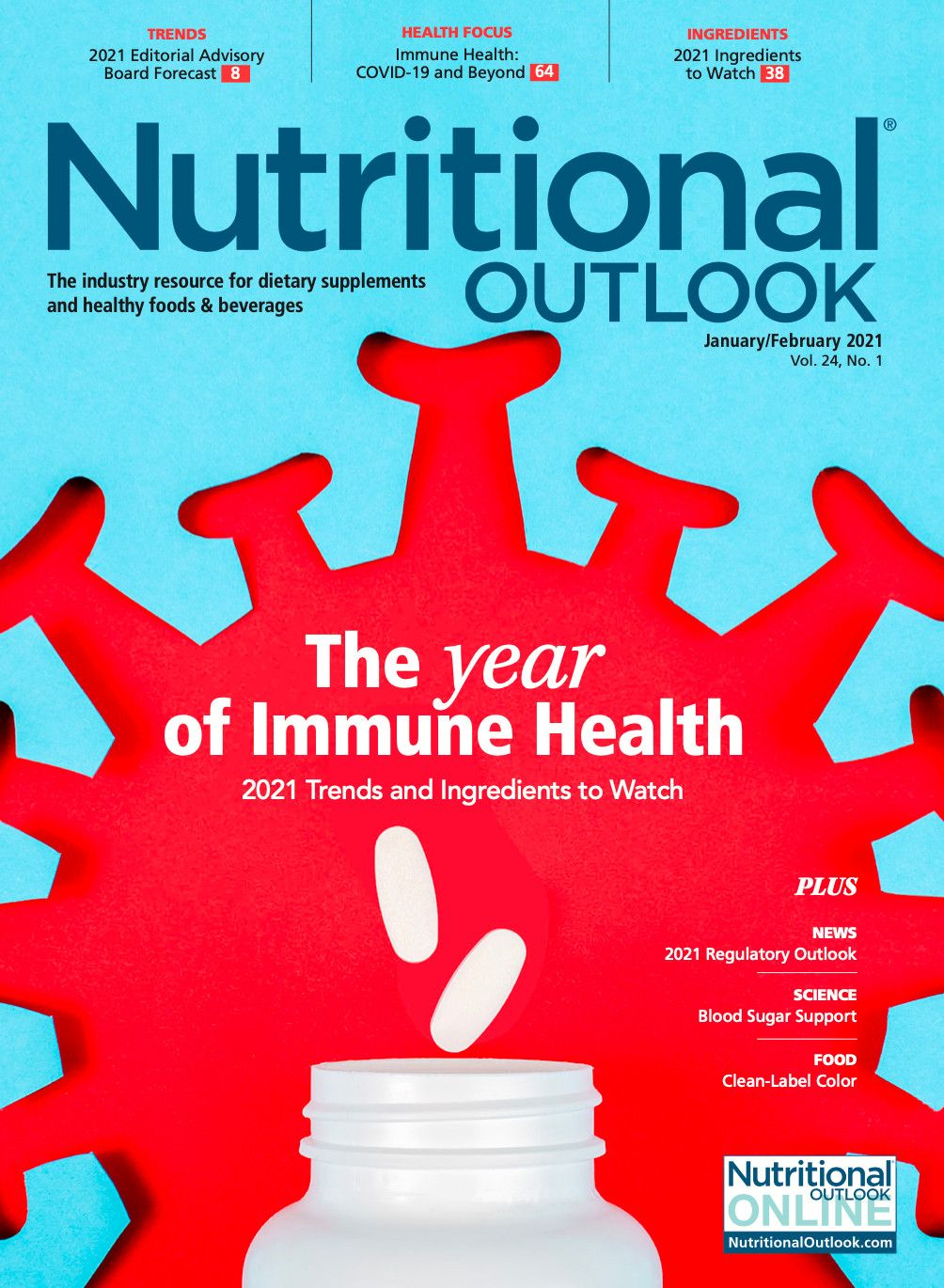Mushrooms sales growth in 2020 promises success this year. 2021 Ingredient trends to watch for food, drinks, and dietary supplements
Mushrooms offer a number of health benefits, including immune and brain support. With continued double-digit growth in the natural retail channel, the mushroom ingredient category is poised for mainstream success.
PHOTO © ESKYMAKS - STOCK.ADOBE.COM

Mushrooms offer consumers a familiar option to support a number of health benefits, including immunity, energy, and stress. Particularly in the U.S. natural retail channel, mushroom-based products have grown in popularity. According to an Herb Market Report published in the American Botanical Council’s (Austin, TX) journal HerbalGram, a number of mushroom ingredients were in the top-40 bestselling herbs in the U.S. natural channel in 2019 and experienced sales growth compared to the previous year.
Based on SPINS data used in the Herb Market Report covering the 52 weeks ending December 29, 2019, the sales of “mushrooms (other)”—a category that includes sales of multiple species, including lion’s mane, turkey tail, and combinations thereof—grew 33% in 2019 compared to the previous year, with $10.6 million in sales, making it the eighth-top-selling ingredient in the U.S. natural channel. When it comes to more specific mushrooms, reishi grew 13.5% to $3.6 million, and cordyceps grew 8.2% to $2.7 million.
In 2020, mushrooms saw additional double-digit growth in the U.S. natural supplements channel and performed particularly well in the immune-health channel. According to SPINS data on the 52 weeks ending November 29, 2020, “mushrooms (other)” grew in sales by 46% compared to 2019 to reach $14.7 million in sales, making it one of the 25 bestselling ingredients in the natural channel. Within the natural channel’s immune-health category, “mushrooms (other)” grew 53.8% to become the top-selling ingredient in the category, while reishi grew 37.8%, cordyceps grew 43.7%, and chaga grew 11.9%. As with many ingredients that experienced increased demand and sales in 2020, the likely culprit for mushrooms’ growth is the COVID-19 pandemic.
“Mushrooms that support immune health have all benefited since the start of the pandemic, with extra media attention and consumer interest, and this extra interest has carried over to the entire mushroom category,” says Gaia Herbs Product Manager Jonathan Fitzpatrick. “As you would expect, this has resulted in a significant increase in demand for safe and natural immune-supportive health products, including supplements featuring mushrooms that support immune health such as chaga, reishi, shiitake, cordyceps, and turkey tail.”
Unfortunately, the success of mushroom ingredients was mostly isolated to the natural channel, likely due to a lack of major CPG brands that utilize mushrooms in the mainstream market. However, this sales growth means many new-to-market consumers have discovered mushrooms for the first time, and with e-commerce, access to desired products is only a few clicks away. Brands like Gaia Herbs and Om Mushroom Superfood can reach consumers directly.
“While Om was experiencing amazing growth before the pandemic began affecting the U.S., we did see a spike in sales during March and April of 2020. Consumers are more aware than ever about their health and wellness, and functional mushrooms provide many with the whole-food boost they are looking for,” says Jan Hall, CEO of M2 Ingredients, the parent company of Om Mushroom Superfood. “The momentum picked up speed throughout 2020, and we expect to see continued strong sales throughout 2021. Consumers are incorporating functional mushrooms into their everyday routines, so we do think this momentum will be sustained even after the pandemic subsides.”
Hall attributes mushrooms’ growth to the self-care movement that took hold during the pandemic. With the increased demand for immune-focused blends and single-species products, Om saw an opportunity and launched a new product in the summer of 2020 that speaks directly to health concerns consumers have during the pandemic.
“In the summer, we launched a new capsule product for respiratory health called Breathe,” says Hall. “It contains a proprietary blend of mushrooms combined with high-potency vitamin D2 sourced from the agaricus mushroom, and zinc. These are ingredients that have become increasingly popular over the past 12 months.”
Blends such as Om’s Breathe product that articulate specific benefits are particularly popular because they’re simple to understand and have built-in synergy between ingredients. “A specific area in the supplements category that is experiencing significant growth is mushroom and herb blends. These blends have helped push mushrooms into the spotlight and have also helped to gain consumer interest and attention,” explains Susan E. Hirsch, MS, CNS, formulation manager for Gaia Herbs.
“At Gaia Herbs, we have also embraced this symbiotic relationship between plants and mushrooms to create blends that can help people thrive in their daily life and have a line of products featuring both mushrooms and herbs in them,” she adds. “Currently, my personal go-to and one of my favorite products is Gaia Herbs Immune Shine Mushroom & Herbs powder, which combines several adaptogenic mushrooms and herbs, including maitake and chaga mushrooms combined with elderberry, ginger, and astragalus.”
The Immune Shine product can be added to a beverage or a smoothie for easy consumption. Convenient delivery formats are a big draw throughout the dietary supplement industry, and mushrooms are no exception.
“Research has shown that millennials tend to prefer non-pill products in much higher percentages than older demographics. We expect to see mushrooms continue to show up in more novel delivery formats such as gummies, chewables, effervescents, syrups, herbal shots, and even infused in lollipops,” says Fitzpatrick. “It will be exciting to see all of the ways that mushrooms will be introduced in the market in new and approachable formats that appeal to younger audiences.”
Om offers products in a wide variety of delivery forms. “There are truly so many ways to incorporate functional mushrooms into a routine, so it’s difficult to say what the most popular usage is. Om Mushroom Superfood powders can be incorporated into smoothies, coffee, cooking, and so much more,” says Hall. “We have seen an uptick in sales for our line of Hot Drink Mixes and Mighty Broths, which we think is due to their ease of use. New products like our Mushroom Coffee Blend can simply be mixed with hot water for an instant boost of focus, immunity, and energy, while the popular Mighty Mushroom Broth is a delicious snack with 7 g of plant-based protein.”
The ability of mushrooms to be incorporated into novel and traditional delivery formats allows manufacturers to capture a wide range of consumers, all of whom are seeking ways to improve their health but have different preferences for how to work these products into their daily routine. Add the wide-ranging benefits mushrooms can provide to this, and the possibilities are almost endless.
Consumers love to have options, but quality is also paramount, and for both Om and Gaia Herbs, quality means using the whole mushroom.
“There have been recent advances in extraction technology, but they are geared towards the isolation of unique compounds, or the mycelium. Gaia Herbs does not use the mycelium, as this part is not traditionally used in herbal medicine and has little science to back up its efficacy,” says Hirsch. “Instead, Gaia Herbs uses the whole mushroom, also known as the fruiting body, in our herbal products and uses traditional forms of extraction technology, most often in water and alcohol.”
Gaia Herbs sources its 100%-certified-organic mushrooms from North American Medicinal Mushroom Extract (Nammex; Gibsons, BC, Canada), whose growing and manufacturing operations are in a remote region of China called Qingyuan County. The raw materials are tested every step of the way. “Gaia Herbs chose Nammex as our mushroom provider as their growing conditions are similar to the mushrooms’ natural habitats,” explains Stephanie Kane, global sourcing specialist for Gaia Herbs. “Before leaving China, after arriving at Nammex, and again at Gaia Herbs, our mushroom extracts are tested for safety, including microbial, metals, pesticides, and fungicides. In addition to this safety testing, both Nammex and Gaia test DNA for identity and for key biomarkers and constituents, with guaranteed levels of beta-glucans.”
M2 Ingredients, for its part, grows its own mushrooms, dehydrates, and mills them, rather than performing extraction. “We grow 11 species of certified-organic, non-GMO mushrooms through every stage of the mushrooms’ life cycle, from start to finish, in our facility that is BRC AA–certified for product quality and safety. Consumers can feel confident not only in continuity of availability but also in the rigorous quality,” says Hall.
Establishing quality in a growing product category is crucial for long-term success as more brands begin to pop up and CPG brands get wise to the opportunity mushroom ingredients promise. The pandemic already put a strain on the supply chain, and an increase in new product development will continue to put the pressure on existing suppliers while also encouraging new suppliers to join the fold.
“The increased demand may spur an increase in growing mushrooms, and hopefully this is done in an ecologically sound way,” says Kane. “Some mushrooms are wild-harvested, and it is important for consumers to be aware of where their mushrooms are coming from and that their supplier is harvesting in a sustainable way.”
One advantage mushrooms have is that they do not require as much time to grow. “While most crops can only be planted at a certain time and need an entire growing season, or years, before they can be harvested, mushrooms usually produce several harvests in a year,” explains Kane. Therefore, the mushroom category may be better equipped to meet growing demand—and more safely than many popular herbs susceptible to economic adulteration.
The pandemic has opened a lot of eyes to the potential of natural products to support one’s health and improve quality of life. Mushrooms are becoming a big part of the trend of self-care, offering a recognizable source material in a wealth of delivery formats and impressive health benefits. The natural channel is cornering the market on mushroom products, but it won’t be long until major mainstream outlets get in on the action.
2021 Ingredient Trends to Watch for Food, Drinks, and Dietary Supplements:
Vitamin C
Melatonin
Vitamin D
CBD
Elderberry
Mushrooms
Ashwagandha
Multivitamins
Protein
Probiotics

Polyphenols: The next generation of prebiotics is ready for liftoff
April 21st 2025Explore the prebiotic health benefits of polyphenols and the positive impact they may have on digestive and immune health. Polyphenols, such as those found in European black elderberry, may be an ideal solution for manufacturers trying to break into the digestive health space.
Prinova acquires Aplinova to further increase its footprint in Latin America
April 7th 2025Prinova has recently announced the acquisition of Brazilian ingredients distributor Aplinova, which is a provider of specialty ingredients for a range of market segments that include food, beverage, supplements, and personal care.

























